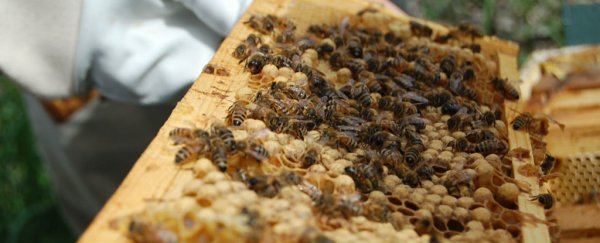Reports out of South Carolina have indicated that when officials approved the spraying of local farmlands with insecticide to prevent the spread of Zika-carrying mosquitos, it accidentally wiped out millions of bees too.
The insecticide in question, called Naled, is known to be "highly toxic" to bees, and these vital pollinators appear to be the latest collateral damage in the fight against Zika.
In response to the ensuing outcry from local farmers after last Sunday's bout of aerial spraying in Dorchester County, the local administrator's office announced that the state health department had reported four travel-related cases of Zika virus in the Summerville area of Dorchester County on Friday 26 August.
While the health department reported that no one has been infected from a local mosquito bite to date, Dorchester County officials justified the accidental bee cull on the grounds that the mosquito population remained a threat.
"Dorchester County is concerned about the safety of its citizens," a statement from the County Administrator's Office reads. "This includes protecting citizens from insect bites from pests such as mosquitoes that carry viruses including West Nile and Zika."
The spraying commenced at 6:30am last Sunday morning, and the effects on bees were reportedly instant.
"Stressed insects tried to flee their nests, only to surrender in little clumps at hive entrances," Ben Guarino reports for The Washington Post. "The pattern matched acute pesticide poisoning. By one estimate, at a single apiary - Flowertown Bee Farm and Supply, in Summerville - 46 hives died on the spot, totalling about 2.5 million bees."
The decision to conduct aerial spraying with Naled - something that's never been done in South Carolina before - is of course highly controversial, but what's perhaps even more contentious is the fact that local officials claim to have warned farmers ahead of Sunday.
If they did, their messaging doesn't appear to have been all that effective.
"Had I known, I would have been camping on the steps doing whatever I had to do screaming, 'No you can't do this,'" beekeeper Juanita Stanley told WCSC-TV. "All of my equipment is contaminated, my honey is contaminated, my cone is contaminated, I'm totally shut down here."
Naled has been in use in the US since 1959, and since then, bee-keepers have gotten pretty good at protecting their hives - if they are prepared.
As Larry Haigh, president of the South Carolina Beekeepers Association, told David Quick at The Post & Courier last year, most county mosquito control programs spray at night when bees are in their hives, and beekeepers can cover them with protective sheeting.
"If the spraying is done during the day, it's definitely going to kill bees and other pollinators that come in contact with it (insecticides)," said Haigh, which brings into question why the aerial spraying was conducted between 6:30am and 8:30am.
Sadly, there's no real silver lining to this story, because there was never any indication that local mosquitos were carrying Zika virus anyway, though South Carolina officials might have been spooked by reports of Zika-carrying mosquitos in a very small neighbourhood in Miami.
And it's a blow to the local bee population that it really can't afford right now. Just last month, the results of an 18-year study revealed just how damaging a different class of pesticides called neonicotinoids can be for bees.
"The chemicals, which farmers apply to their crops to keep away insects that munch through their harvests, are among the most-used bug-killers out there," Meghan Bartels reported for Business Insider in August.
The results supported the findings of a previous study that confirmed for the first time that even the small amounts of neonicotinoid insecticide found in nectar and pollen is enough to affect the brain activity of the bumblebees that consume it.
It's pretty incredible to consider that without bees, 70 percent of the fruit, vegetables, seeds, and nuts we consume on a daily basis will struggle to reproduce.
As the AsapSCIENCE video below explains, if bees disappear, it's not only going to affect what we eat, but also what we wear, and what we feed our livestock, which means milk, cheese, egg, and meat production is in jeopardy.
But we humans were never very good at planning ahead.
